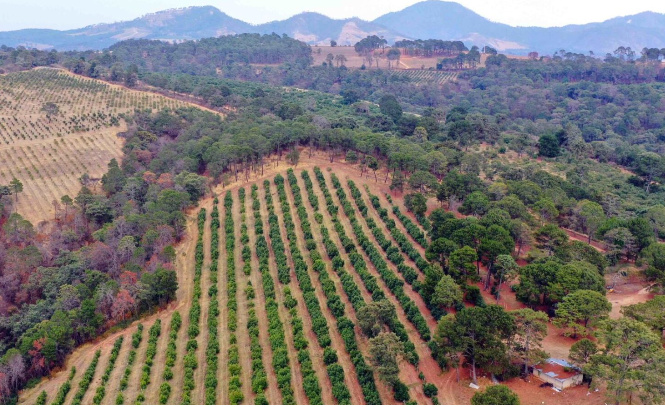- In Jalisco, avocado orchards are spreading and dominating the landscape: In 2010, there were about 8,400 hectares (about 20,750 acres) of this monoculture, and by 2021, that area had tripled.
- Satellite images show what is lost with the expansion of the Persea americana monoculture: Since 2019, at least 5,160 ha (12,750 acres) have turned from forests to avocado orchards.
- The loss of forest cover could continue indefinitely, especially after the United States government authorized the commercialization of avocados harvested in Jalisco in July 2022.
In western Mexico, a forest was cleared in a couple of days. It was the early morning of a spring day in 2020. A dozen workers arrived in two trucks escorted by armed men aboard a van. Minutes after their arrival, the high-pitched shriek of chainsaws scared the birds into flight through the canopy of the trees. This was followed by the noise of the crane’s motor and the shouts of those who organized the handling of large trunks of pines, oaks and oyamel firs.
The episode wasn’t news for the inhabitants of that corner of the Sierra de Cacoma, municipality of Cuautla, Jalisco. The forests in the contiguous lands had been felled under the same pattern and for the same purpose: to transform those sites into avocado orchards.
“They felled trees that had not been touched for many decades, an inheritance from my father and my grandfather; it seems that there is no one who can stop them,” the ranch owner complained bitterly during a meeting of the Jalisco Regional Livestock Union, on April 29, 2022, in Guadalajara. The state’s Secretary of Agriculture and Rural Development Ana Lucía Camacho, was there. The man got only vague promises.
The small owner, who for security reasons asks that his identity be kept anonymous, remembers what he said that day: the destruction of his forestlands happened at the beginning of the COVID-19 pandemic. He was out of the country since he was a migrant, like a good number of the natives of Cuautla, famous in the United States for their Mexican food restaurants. The man who looks after his land called him with the news: Strangers had invaded the ranch and cut down an old-growth rodal, a term used to identify a group of tall, robust trees that were decades old. “That day, I cried with frustration, with anger. It was a heritage I loved very much, and I wanted to turn it into a space for cabins for ecotourism. It was my retirement plan.”

